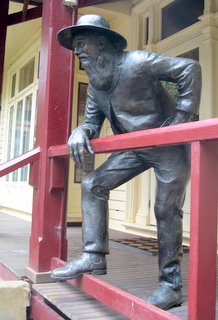Related Research Articles

Andrew Barton "Banjo" Paterson, was an Australian bush poet, journalist and author. He wrote many ballads and poems about Australian life, focusing particularly on the rural and outback areas, including the district around Binalong, New South Wales, where he spent much of his childhood. Paterson's more notable poems include "Clancy of the Overflow" (1889), "The Man from Snowy River" (1890) and "Waltzing Matilda" (1895), regarded widely as Australia's unofficial national anthem.

"The Man From Ironbark" is a poem by Australian bush poet Banjo Paterson. It is written in the iambic heptameter.
"Up The Country" is a popular poem by iconic Australian writer and poet Henry Lawson. It was first published in The Bulletin magazine on 9 July 1892, under the title "Borderland." Its publication marked the start of the Bulletin Debate, a series of poems by both Lawson and Andrew Barton "Banjo" Paterson asserting contrasting views of the true nature of life in the Australian bush.
In Defence of the Bush is a popular poem by Australian writer and poet Andrew Barton "Banjo" Paterson. It was first published in The Bulletin magazine on 23 July 1892 in reply to fellow poet Henry Lawson's poem, Up The Country. Paterson's rebuttal sparked the Bulletin Debate, a series of poems by both Lawson and Paterson about the true nature of life in the Australian bush.
The City Bushman is a poem by iconic Australian writer and poet Henry Lawson. It was first published in The Bulletin magazine on 6 August 1892, under the title In Answer to "Banjo", and Otherwise. It was the fourth work in the Bulletin Debate, a series of poems by both Lawson and Andrew Barton "Banjo" Paterson, and others, about the true nature of life in the Australian bush.
This article presents a list of the historical events and publications of Australian literature during 1917.
The Poets of the Tomb is a poem by Australian writer and poet Henry Lawson. It was first published in The Bulletin magazine on 8 October 1892 in reply to fellow poet Andrew Barton "Banjo" Paterson's poem, In Answer to Various Bards.
Saltbush Bill is a humorous poem by Australian writer and poet Andrew Barton "Banjo" Paterson. It was first published in The Bulletin magazine on 15 December 1894, the Christmas issue of that publication.
Saltbush Bill's Gamecock is a humorous poem by Australian writer and poet Andrew Barton "Banjo" Paterson. It was first published in Brooks's Australian Xmas Annual Volume 1 1898.

Saltbush Bill's Second Fight is a humorous poem by Australian writer and poet Andrew Barton "Banjo" Paterson. It was first published in The Antipodean in 1897.
Saltbush Bill on the Patriarchs is a humorous poem by Australian writer and poet Andrew Barton "Banjo" Paterson. It was first published in The Evening News on 19 December 1903.
Saltbush Bill, J.P. is a humorous poem by Australian writer and poet Andrew Barton "Banjo" Paterson. It was first published in The Evening News on 16 December 1905.
A Bush Christening is a humorous poem by Australian writer and poet Andrew Barton "Banjo" Paterson. It was first published in The Bulletin magazine on 16 December 1893, the Christmas issue of that publication. It has been called "a rollicking account of how the traditional pre-occupations, whisky and religion, come together".
Rio Grande's Last Race is a racing poem by Australian writer and poet Andrew Barton "Banjo" Paterson. It was first published in the London Sketch magazine on 16 December 1896. It was later published as the title poem for Paterson's second poetry collection, Rio Grande's Last Race and Other Verses, in 1902.

Saltbush Bill, J.P., and Other Verses (1917) is the third collection of poems by Australian poet Banjo Paterson. It was released in hardback by Angus and Robertson in 1917, and features the poems "Waltzing Matilda", "Saltbush Bill, J.P.", "An Answer to Various Bards" and "T.Y.S.O.N.".
This article presents a list of the historical events and publications of Australian literature during 1864.

Jessie Urquhart was an Australian journalist, novelist and short-story writer.
"The Cast-Iron Canvasser" is a humorous short story by Banjo Paterson. It was first published in the 19 December 1891 issue of The Bulletin, and later included in the author's short story collection, Three Elephant Power and Other Stories, and in many short story anthologies.
"A Bushman's Song" (1892) is a poem by Australian poet A. B. Paterson.
"His Father's Mate" is a melodramatic short story by Henry Lawson. It was first published in the 22 December 1888 issue of The Bulletin, and later included in the author's short story collection, While the Billy Boils, and in many short story anthologies. It was the author's first published short story.
References
- ↑ "Austlit — Three Elephant Power and Other Stories by Banjo Paterson". Austlit. Retrieved 30 August 2023.
- ↑ ""Banjo Paterson's New Book"". The Richmond River Herald and Northern Districts Advertiser, 9 November 1917, p8. Retrieved 30 August 2023.
- ↑ ""New Publications"". Goulburn Evening Penny Post, 1 December 1917, p4. Retrieved 30 August 2023.
- ↑ The Oxford Companion to Australian Literature edited by Wilde, Hooton and Andrews, 2nd edition, p679